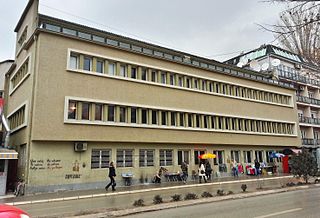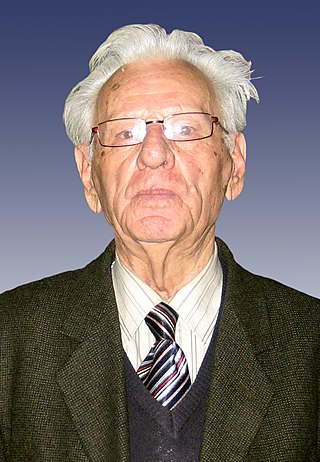This article needs additional citations for verification .(September 2020) |
The Faculty of Islamic Studies (FSI or Albanian : Fakulteti i Studimeve Islame) is a higher education institution based in Pristina, Kosovo.
This article needs additional citations for verification .(September 2020) |
The Faculty of Islamic Studies (FSI or Albanian : Fakulteti i Studimeve Islame) is a higher education institution based in Pristina, Kosovo.
Seeing the need for higher-quality Islamic education in Kosovo, the Islamic Community of Kosova Assembly founded the Faculty of Islamic Studies under by-law 443/92. The school began operations in December 1992, electing Dr. Rexhep Boja its first dean, Mr. Quemajl Morina as its first vice dean, and Sabri Bajgora as its first secretary.
The first seminar on Islamic apologetics was given by the doyen of Islamic journalism in Kosovo, Sherif Ahmeti, who taught a course for three years on aqidah.
Enrollment and employment were light in the early days, with only one doctor of science, one master’s holder, and a few other theologians on staff. By its 10th anniversary in 2002, however, the school had graduated 4 doctors of Islamic Sciences, 5 masters’ candidates, and 6 lecturer-theologians preaching in Cairo, Beirut, Amman, and Damascus among other places. [1]
Students enroll from throughout the Albanian diaspora, including Kosovo, North Macedonia, Montenegro, Albania, and the Preševo Valley. A Student Association organizes events such as conferences with FSI and visiting professors. The student publication is known as Zgjimi Islam (“Islamic Awakening”).
The FSI library includes several hundred old manuscripts and several thousand theological and other spiritual works. [2]

The University of Pristina is a public university located in Pristina, Kosovo. It is the institution that emerged after the disestablishment of the University of Pristina (1969–1999) as a result of the Kosovo War. The inauguration of the university was a historical occurrence not only for the people of Kosovo, but for the whole Albanian nation. On 15 February, the solemn Parliament session took place, which is also proclaimed as The University of Pristina's Day. In the composition of the newly established University of Pristina were faculties with their headquarters in Pristina: the Faculty of Philosophy, Faculty of Law and Economics, Faculty of Engineering and Faculty of Medicine. Now the University of Pristina has 17 faculties, of which 14 are academic faculties and 3 are faculties of applied sciences. Contained within the emblem is a translation of the name into Latin, Universitas Studiorum Prishtiniensis.

Aleksandër Moisiu University of Durrës, also Aleksandër Moisiu University or University of Durrës, is the newest public academic institution of the Republic of Albania. The University is located in the ancient city of Durrës. The university was founded on 20 December 2005 by the Albanian Government. It was inaugurated in 2006 and is using the American system of education, unlike the rest of the public universities in the country. More than 1,300 students started classes as of 2 October 2006. University of Durrës took its name from Austrian-Italian actor Aleksandër Moisiu, who was of Albanian descent. The rector is Kseanela Sotirofski.

The Luigj Gurakuqi University of Shkodër is an Albanian public university established in 1957.

Mehdi Bardhi was a Kosovar linguist, author, and teacher.

The Agricultural University of Tirana is a public university located in Tirana, Albania. It offers education in agronomy, veterinary, forestry, ecology, agribusiness, and similar subjects.

Luarasi University is a university in Tirana, Albania. It offers degrees in Law, Economics, Information Technology and Medical Sciences. It was founded in 2003 by decree of the Albanian government to license a private university.

The University of Pristina was founded in the Socialist Autonomous Province of Kosovo, Socialist Republic of Serbia, Yugoslavia, in the city of Pristina, for the academic year 1969–1970 and functioned until 1999. However, owing to political upheaval, war, successive mutual expulsions of faculty of one ethnicity or the other, and resultant pervasive ethnic-based polarisation, there came to be two disjoint institutions using the same name, albeit idiosyncratically to reflect ethnic identity. Albanian-language activity continues at the original location, whilst the Serbian-language University of Priština has relocated to North Mitrovica, where it maintains its place within the Serbian education system.
Classical music in Kosovo refers to the art music cultivated in Kosovo. The roots of classical music in Kosovo are found in the 1940s and include the time period from the times when Kosovo was part of Yugoslavia to this day. It can be said that there is a tradition of classical music in Kosovo, however, compared to other Balkan countries and especially European countries this tradition is younger. Classical music in Kosovo reaches back about 70 years. Even though in a short period of time, this music has evolved, passing through generations of composers and artists. In his book Albanian: Zhvillimi i stileve në veprat e kompozitorëve shqiptarë të Kosovës, Engjëll Berisha comments:
The diversity of styles in Albanian music [of Kosovo], its national patterns with sound idea-aesthetic foundations are a characteristic of the European musical reality, so many many works are of interest abroad, too, because during this relatively short period Albanian classical music in Kosovo has compensated for the delay in its development.
The literature of Kosovo is composed of literary texts written in Albanian, Serbian, Bosnian, and Turkish, specifically by authors of Kosovo. Kosovo produced several prominent writers in the Ottoman era. However, Ottoman authorities banned the written use of the Albanian language until 1912. This policy continued during Serb rule until the outbreak of World War II.

Islamic monuments in Kosovo are commonly related with the Ottoman arrival in 1389, and respectively with their effective establishment in Kosovo in 1459. However, many historical evidences show that the first encounters of Islam with the Balkans happened well before the arrival of the Ottomans and their establishment in the Balkans. Because of its proximity to the centers of Islam, i.e., Middle East, the Byzantine Empire and parts of the Balkans, including the Albanian territories and Kosovo as well, were exposed to Islam as early as in the 8th century.

In the past, Kosovo’s capabilities to develop a modern health care system were limited. Low GDP during 1990 worsened the situation even more. However, the establishment of the Faculty of Medicine in the University of Pristina marked a significant development in health care. This was also followed by launching different health clinics which enabled better conditions for professional development.
Kosovo does not have an official religion. Like the rest of the country, the majority of Pristina's population consider themselves to be Muslim. However, religious practices may tend to be liberal. Many do fast for Ramadan and praying is widely practiced.
Music composition and composers in Pristina refers to music composition and composers who have left their mark in Pristina. The importance of Kosovan Folklore on the different genres, their development and their popularity. As referring to genres as a categorization would not cover all compositions and composers in a fair way, a highlight of every composers work and different genres is provided because of the different genres a composers work has included throughout the years.

The Faculty of Arts of Pristina is the faculty of arts of the University of Pristina, located in Pristina, Kosovo.

Idriz Ajeti was an Albanologist from Kosovo and one of the main researchers and authorities on the Albanian language studies of post World War II. He was involved for a long period in the academic life of the University of Pristina, and was a member of the Academy of Sciences and Arts of Kosovo, being its chairman for seven years.

Education in Kosovo is carried out in public and private institutions. Starting from 1999, education in Kosovo was subject to reforms at all levels: from preschool education up to university level. These reforms aimed at adjusting the education in Kosovo according to European and global contemporary standards. As a first step of this new system is considered the establishment of the Department of Education and Science (DES), which is followed with the creation of legal and professional infrastructure, which should facilitate the fundamental reformation of the education, and the establishment of the Ministry of Education, Science and Technology (MEST) in March 2002. During this period the private education system began to develop.

Universiteti i Mitrovicёs "Isa Boletini" is a public university located in the city of Mitrovica, Kosovo.
Haki Xhakli is a Kosovo Albanian painter and a university professor from Kosovo. He is known for his composition paintings where figures of horse, castle and woman dominate.
Muhammad Mufaku Al Arnaut is a Kosovar Albanian Syrian and retired professor of Middle East studies.
Pajazit Nushi was a university professor, psychologist and scientific and social-political worker from Gjakova, Kosova. Member of the Academy of Sciences and Arts of Kosovo.